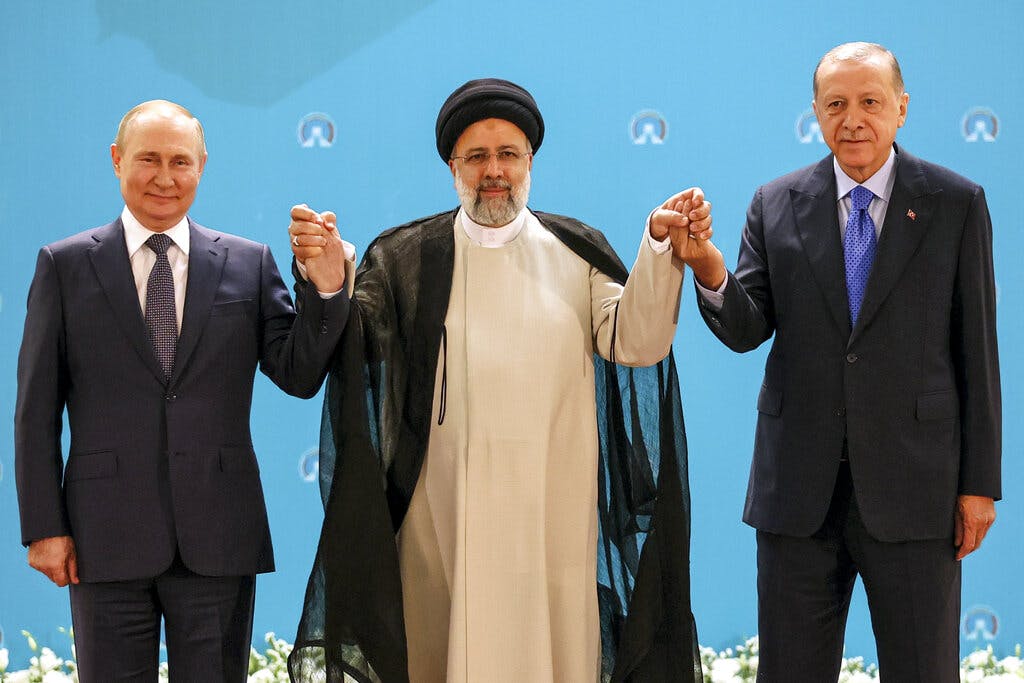Russia, Turkey, and Iran Walk Into a Bar …
Parley of potentates in Persia foreshadows a challenge to America and our Mideast allies.

While some notable fissures were apparent during today’s strongman summit at Tehran, the powwow also showed that the Iranian-Russian-Turkish alliance could pose a challenge to America and our Mideast allies.
Presidents Putin of Russia, Raisi of Iran, and Erdogan of Turkey have many reasons to get together, including Moscow and Tehran’s desire to counter President Biden’s vow during his trip to the region last week to step up American engagement in order to prevent a power “vacuum” being filled by China, Russia, or Iran.
While Turkey is not under sanctions like Iran and Russia, it is increasingly eyed with suspicion in Washington. Last week, the House resolved to create hurdles to Mr. Biden’s intent to sell F-16 fighter jets to Ankara. Mr. Erdogan, perhaps in retaliation, threatened to renew his opposition to adding Finland and Sweden to NATO.
Meanwhile, Russia and Iran are striving to find markets for their oil. Mr. Erdogan, presiding over an ailing Turkish economy on the eve of an election, is in the market for discounted energy sources. So, many ingredients were in place to make the three-way summit a great success for all its participants.
Yet, what about the situation in Syria, the official reason for the get-together?
The three leaders ostensibly decided to meet to discuss the Mideast’s longest active multi-sided civil war. The three countries started discussing Syria in 2018; known as the Astana Process, they created an alternate path to United Nations-led diplomacy backed by America and Europe. Yet, Turkey and the Russian-Iranian alliance disagree on Syria.
Mr. Erdogan has long planned a military invasion to create a 20-mile-wide “safe zone” inside Syria. He wants to resettle more than a million Syrians and other Arabs currently housed in Turkish refugee camps in that area near the Turkish border. The area is controlled by Kurds, long reliable American allies in the war against ISIS. They fear that a Turkish invasion would end the de-facto Kurdish autonomy there.
Iran and Russia back President Assad and are opposed to a Turkish invasion of Syria. Yet, railing against “terrorists” — the American-backed Kurdish fighters battling ISIS — Mr. Erdogan told Mr. Raisi today they are “troublemakers both for Turkey and Iran,” adding: “We need to continue the fight against them in solidarity.”
Tehran disagrees even about who is a terrorist. “Any sort of military attack in northern Syria will definitely harm Turkey, Syria, and the entire region, and will benefit terrorists,” Iran’s supreme leader, Ayatollah Khamenei, said during the public portion of his meeting with Mr. Erdogan.
If Mr. Erdogan ends up ignoring the Iranian and Russian warnings and invades northern Syria, it would be because “he has to do something over there,” a New York-based correspondent for Hurriyet, Razi Canikligil, told the Sun. “The election is coming up next year and Erdogan’s popularity is down to 25 percent,” he said, adding that a Syrian invasion could blunt the public’s anger over Turkey’s failed economy.
Yet, without a green light from Iran or Russia, such an invasion may be too difficult to execute, a Turkey watcher at the Foundation for Defense of Democracies, Sinan Ciddi, said. “Let’s be honest, Turkey has no strategic reason to fight the Syrian Kurds,” he told the Sun. Also, he added, “I don’t think Erdogan has the mechanism” to execute such an invasion and resettle more than a million refugees in the Kurdish-held zone.
Intead, Mr. Ciddi says, Mr. Erdogan may well cut a deal with Russia to facilitate the delivery of Ukrainian grains through the Black Sea to the Mideast, North Africa, and beyond. Such a deal could benefit Turkey and would be supported by America, most of Europe, and the Arab world.
Arabs, Africans, and others, including Turks, have long depended on imports of affordable grains from Ukraine. Russia has blocked such deliveries since the start of its invasion. Foodstuff prices have risen significantly around the world. Any solution brokered by Mr. Erdogan could make him a global hero.
If Mr. Erdogan “is able to cut a deal with Putin to get those grains out, he would look good,” a former national security adviser to President Trump, Robert O’Brien, told Fox News. Yet, he added, Mr. Putin “is not going to do that without some sort of a fee,” which would either be monetary or in the form of a “political concession.”
Mr. Erdogan has so far managed to retain his ties with all sides in the war in Europe. Ankara has declined to join American and European sanctions against Moscow, and Turkey has become a haven for oligarchs and sanctioned Russian firms. On the other hand, Turkey is selling Ukraine lethal drones that have proved effective in the war, and now is forcing Moscow to purchase similar drones from Iran.
One concession Mr. Putin could demand in exchange for ending his hold over Ukrainian grain exports is for Turkey to stop its arms deliveries to Kyiv. There are also other areas, beyond Syria and Ukraine, where Ankara’s interests clash with Moscow’s, including Azerbaijan. Mr. Putin also could demand Turkish concessions there as well.
Iran’s interests also differ from Russia’s and Turkey’s, yet the leaders of the three countries understand each other, as they all are autocrats that appreciate muscular policies. If America doesn’t watch out, we — rather than they — could end up as the most isolated party in Mideast politics.

